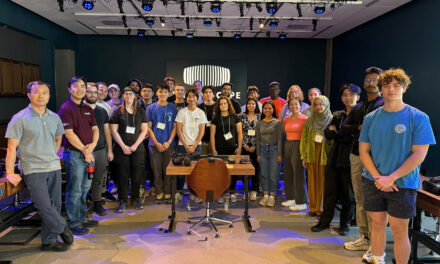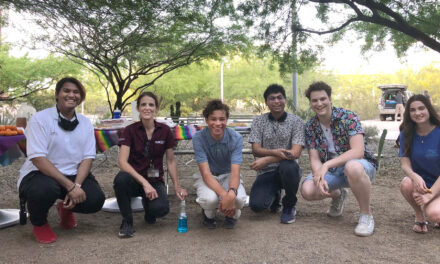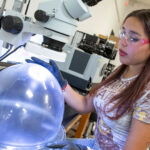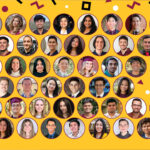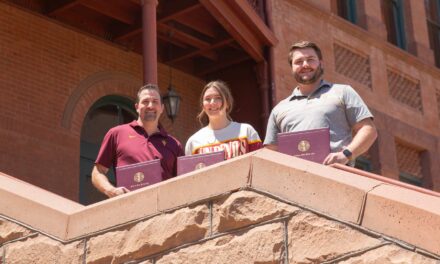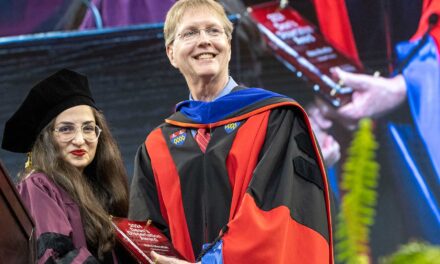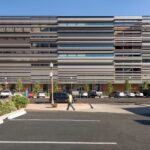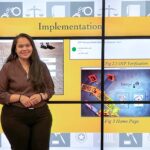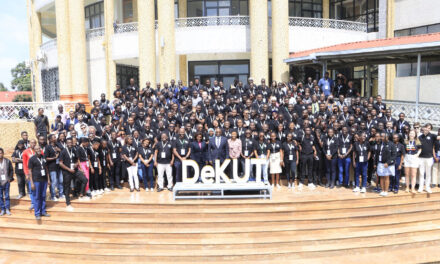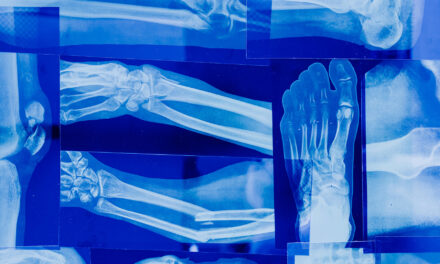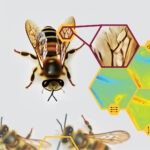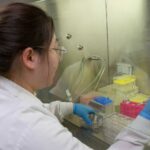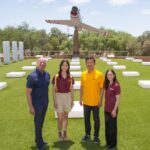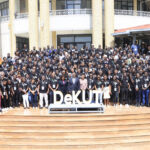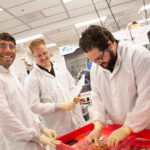
ASU engineering students learn to thrive with peer mentors
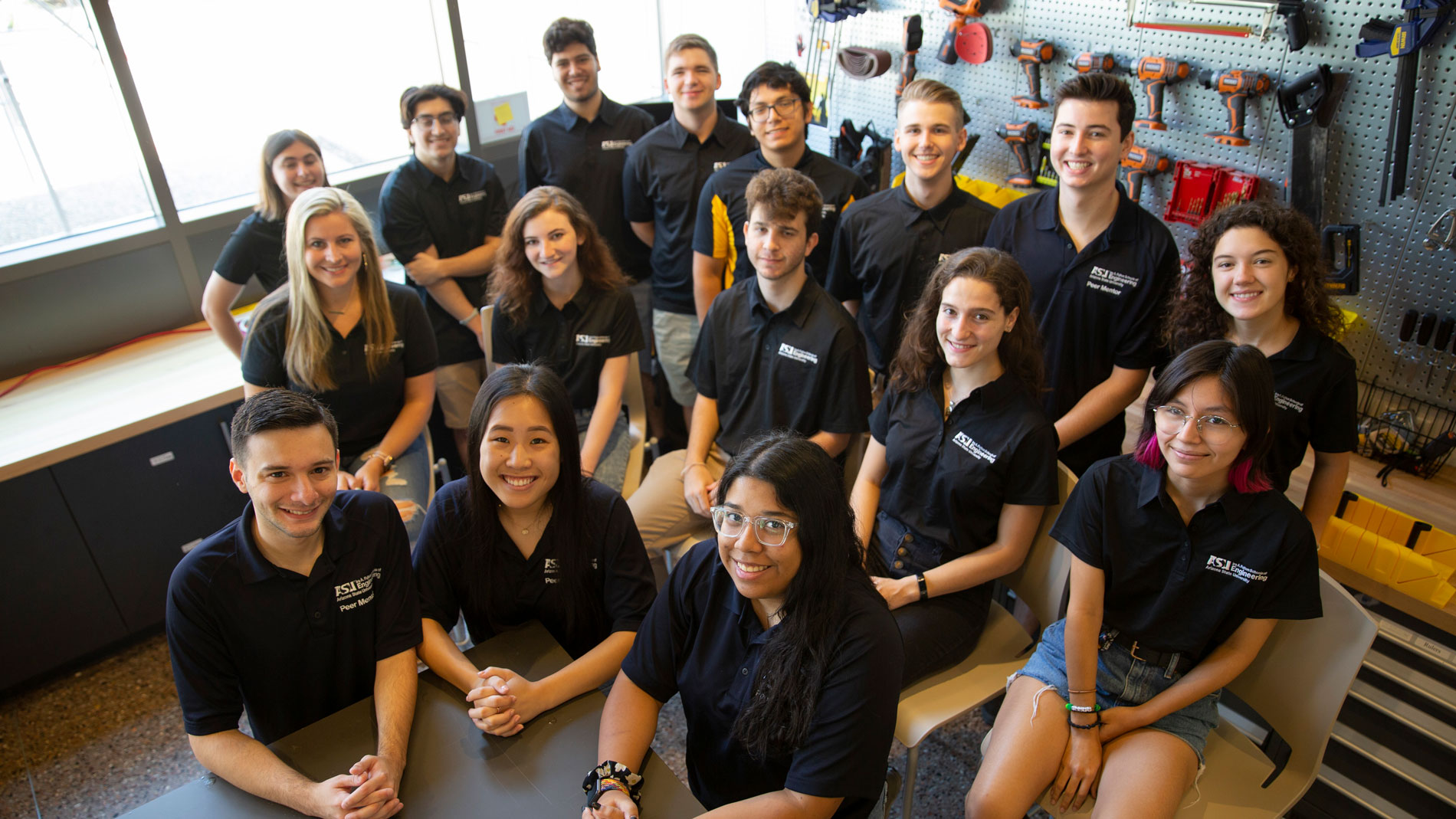
Above: A group photo of the Fall 2021 peer mentors in the Ira A. Fulton Schools of Engineering at Arizona State University. The peer mentor program pairs all first-year and transfer students in the Fulton Schools with a sophomore, junior or senior to support them as they begin their college journey. This photo was taken before ASU's social distancing and face covering recommendations went into effect. Photographer: Erika Gronek/ASU
Having support at the start of college could be the difference between dropping out and thriving. So, students in the Ira A. Fulton Schools of Engineering at Arizona State University arrive with a person already in their corner: their peer mentor.
Every Fulton Schools first-year and transfer student is assigned one of 25 peer mentors who can support their needs as an on-campus, commuter or online student.
Peer mentors are sophomore, junior and senior students who come from many of the same backgrounds as their mentees. They’re first-generation college students and transfer students who live on campus or commute and bring a wide range of experiences to the table. And, like many of the students they mentor, some of them also came to ASU lost and confused.
For Joey Dimodica, a biomedical engineering senior who is the lead peer mentor for the 2021-2022 academic year, having a peer mentor his first semester was a catalyst for being a successful engineering student.
“I am a first-generation, low-income student, and there isn’t really a handbook that you’re given to start off,” Dimodica says. “My peer mentor was a sort of first-responder to many of the issues I might have encountered in my first year here.”
Chloe Jackson, a graphic information technology senior, wishes she had asked her own peer mentor for more help during her overwhelming transition to ASU as a transfer student.
“Knowing what I know now, I wish I had interacted more with her and had actually gone to the events she was promoting,” says Jackson, who has been a commuter peer mentor and will be a residential peer mentor this fall. “This would’ve allowed me to meet other people and create friendships so I didn’t feel so isolated when I came to ASU.”
Now that these peer mentors and others have figured out their own paths to success — either with the help of their peer mentor or through their own experiences — they want to share their knowledge with peers who are in the same position.
As students in engineering, we know the struggle and we are all eager to share the knowledge that we have gained from succeeding and failing throughout our years here. If you live in Tooker House, there are 14 uniquely qualified peer mentors here to share their experiences. If you’re a transfer or commuter student, odds are your peer mentor will be as well. From writing resumes to joining a club, each peer mentor has different approaches to the Fulton Schools experience, and theirs probably won’t be exactly like yours, but they can help.
— Joey Dimodica, biomedical engineering senior, lead peer mentor
Peer mentors driven to help others
Many current peer mentors had their own mentorship experiences that encouraged them to want to give back in similar ways. Support from staff, faculty and alumni mentors is invaluable, but getting help from another student who is going through the same program and experiences can be an even bigger boost to students starting their college journey.
“Peers can bond in a way that cannot be found in other mentor-mentee relationships, which makes this program extremely special,” says Mason Ulrich, a chemical engineering senior who will start his first semester as a peer mentor in the fall.
And as a first-generation college student pursuing a difficult degree, he knows the struggles many of his peers face on their journeys.
“People who are going into engineering are constantly told how impressive they are for setting their sights on a challenging career path,” Ulrich says. “While the praise is nice, it can be unnerving and unsettling.”
Ulrich and other students often question whether they’re good enough to be an engineering major or if they should change majors.
“Students need someone to guide them through the reality of getting an engineering degree so these questions turn into ‘How can I challenge myself?,’ ‘Can I double major?’ and ‘Where can I go to share my talents and skills?’” says Ulrich, who is also earning a certificate in cross-sectional leadership from ASU’s Watts College of Public Service and Community Solutions.
“I want to foster a community that unites all students and makes the transition into their new lives as smooth as possible,” he says. “Being part of that is something special.”
A lot of students believe that once they get to college they are on their own and should have it all figured out, but they don’t need to! If they have questions, we are here to help. Moreover, the events we hold for our students allow them to make friends, get out of their comfort zone and have a memorable experience they can look back on.
— Chloe Jackson, graphic information technology senior, Polytechnic campus residential peer mentor
How peer mentors help new students
Even though many Fulton Schools peer mentors live in the residence halls with their mentees, they do more than help with the challenges of living in a dorm. They also facilitate getting students connected to the many ASU resources available to them.
Peer mentors plan activities that fall into what they call the three gears: Fulton and family connection, personal development, and professional and technical development.
Together, they develop in-person and virtual events throughout the year that get the three gears turning in fun and engaging ways for first-year and transfer students. These include cover letter, resume and LinkedIn workshops, social events such as volleyball tournaments and game nights, chances to meet faculty members in a casual setting and skill-building workshops.
One of the first activities the peer mentor team has planned for the Fall 2021 semester is a skill-building event called How to Solder.
“This event allows peer mentors to emphasize the skills they have developed and share that knowledge with first-year students,” Dimodica says.
Aside from planned events, peer mentors can set their own times to connect with mentees by having their dorm room doors open — or being available for remote conversations with commuters — so students can chat with them.
“Peer mentors are trained to offer support in a wide array of things from finding jobs, research labs and internships, to time management, getting connected, finding inner joy and building a sense of belonging at ASU,” Dimodica says.
Luis Avina, an informatics junior who will start his second year as a peer mentor this fall, says because first-year students don’t know what they don’t know, peer mentors are there to help with fundamental college skills.
“Building those habits of going to office hours, forming study groups and going to the tutoring center are things that can help you not just your freshman year, but going forward throughout your academic career,” Avina says.
For the past year, both peer mentors and their first-year students have faced new challenges with the COVID-19 pandemic. It has become even more important to connect with peers, but also more difficult to do so.
“We tried to find creative ways to connect with people, whether it be socially distanced or through Zoom, but it was more challenging to connect with everyone in a safe way,” Avina says. “It was easy to get disconnected even with technology right there at our fingertips.”
With the return to campus this fall, peer mentors are looking forward to hosting more in-person events and making meaningful connections with mentees and the wider Fulton Schools community.
We’ve been freshmen and not known things. The best way to use your resources is to approach us, just say “hi” and get your foot in the door. Understand that it’s OK to ask for help.
— Luis Avina, informatics junior, Tooker House second-year residential peer mentor
The challenges are worth the rewards
In addition to planning events and making themselves available to help, peer mentors are students too. They wake up, grab a coffee, go to class, study and get involved outside of the classroom.
It can be challenging to fit all those things into a typical day or week, but the payoff is particularly rewarding.
“Most of all, we get to do what we love and share our enthusiasm with the first-year and transfer students we live with,” Dimodica says.
Peer mentors enjoy seeing their students make friends, get research lab positions or find their own leadership positions.
While peer mentors see success stories play out all the time, they sometimes get to see particularly big impacts of their work.
“My most memorable success story is when one of my students was going from wanting to drop out of college altogether to having a 4.0 semester GPA,” says Jenny Wong, a biomedical engineering senior and honors student in Barrett, The Honors College, who is going into her second year as a residential peer mentor at Tooker House. “They were shaken up after one of their first exams and got it into their head that they were not cut out to be an engineer and not cut out for college in general. We talked things through and we came up with an attack plan for the upcoming semester to keep them on track. I checked up on them once a week and taught them some easy ways to cope with anxiety as it comes up.”
“I helped this student find their own ways to be successful and it clearly paid off,” she says.
Dimodica had a similar experience with a student who started during a spring semester.
“Spring admits have a whole new set of challenges to contend with,” he says, also noting the resilience these students bring to ASU. “When someone starts during the spring, they’re entering an environment where maybe others have already developed friend groups or have been involved with a club or organization.”
Aishwary Sharma was a new international student facing these challenges and more in the spring of 2021. In addition to learning to navigate a new country, a new school and figuring out his career path, Sharma also struggled with mental health and self-confidence from his experiences with bullying in his past.
But early on during his first semester, Sharma took the opportunity to say hello to Dimodica outside of Tooker House.
“That day [I met Dimodica] made me feel like I had someone to talk to, share my problems with and that I am not alone in this new country,” Sharma says.
Sharma found that going out of his comfort zone to talk to Dimodica motivated him to not only improve his academic and communication skills and to get more involved, but Dimodica was also a good listener and supporter when Sharma was feeling alone, homesick and scared.
“You have someone you can reach out to whenever you are overwhelmed, feeling empty or in bad shape and they are like your elder siblings who will help you navigate out of your problems,” says Sharma, who is now beginning his second semester as a computer science major and business minor.
By knowing he had someone there for him who understands him, Sharma’s confidence grew and he was able to tackle challenges he didn’t think were possible.
“I got a summer community assistant position [that isn’t usually open to first-year students] and it was a great feeling when I was the youngest CA in the crew,” Sharma says. “Joey was the source of motivation and he told me, ‘I believe in you and I think you have the skills that a lot of sophomores don’t have. Don’t give up!’”
Sharma is glad to have peer mentors in Tooker House who really care for their residents. Now as the incoming president of the Tooker and San Pablo Residential Council, he is grateful for the hardworking team of peer mentors making the residential halls a more happy, welcoming and safe place to live.
And Dimodica is happy to see students like Sharma thrive.
“It is always fulfilling to see the joy that students have when they achieve what they set their minds to and work tirelessly toward,” Dimodica says.
I understood if I want to get involved, I have to get out of my comfort zone, talk to people and build connections. I believe my peer mentor Joey Dimodica helped me a lot to overcome those obstacles because at first, I was very scared and confused on what to do. A lot of times I felt alone and homesick but Joey was always there to help me and support me as an elder brother. He pushed me on the opportunities and motivated me to work on them.
— Aishwary Sharma, first-year computer science major and business minor, Tooker and San Pablo Residential Council president
Peer mentors gain their own valuable skills
Erin Huber earned her bachelor’s degree in mechanical engineering from ASU in 2018, and was a peer mentor for three of her four years at ASU.
In reflecting on her time as a peer mentor, the skills she gained — leadership, time management, budgeting, planning and communication — have been helpful in her positions with aerospace companies Boeing and Blue Origin.
Huber says being a peer mentor was the best experience she had in college.
“I felt so integrated into the Fulton Schools community and really felt like I was making an impact with the students around me,” Huber says. “Knowing that I did my part in helping them be successful in school and getting jobs they enjoy gives me warm, fuzzy joy.”
Today she continues to mentor peers in industry as well as conducting science, technology, engineering and math outreach.
Current Fulton Schools peer mentors are already seeing benefits as students. Jackson says being a peer mentor has helped her become a better student and leader through improving her skills in public speaking, organization, event planning, teamwork and time management.
Others find they have greater knowledge of the resources at their fingertips or they feel inspired to improve themselves.
“Being a peer mentor keeps me up on my game,” Dimodica says. “I want to set a good example, I want to keep up with my work and I want to achieve. Having the opportunity to be a peer mentor has easily been the most rewarding experience of my time at ASU.”
Are you an Ira A. Fulton Schools of Engineering first-year or transfer student? Do you have questions or need help finding your peer mentor? Reach out to [email protected] for more information.






